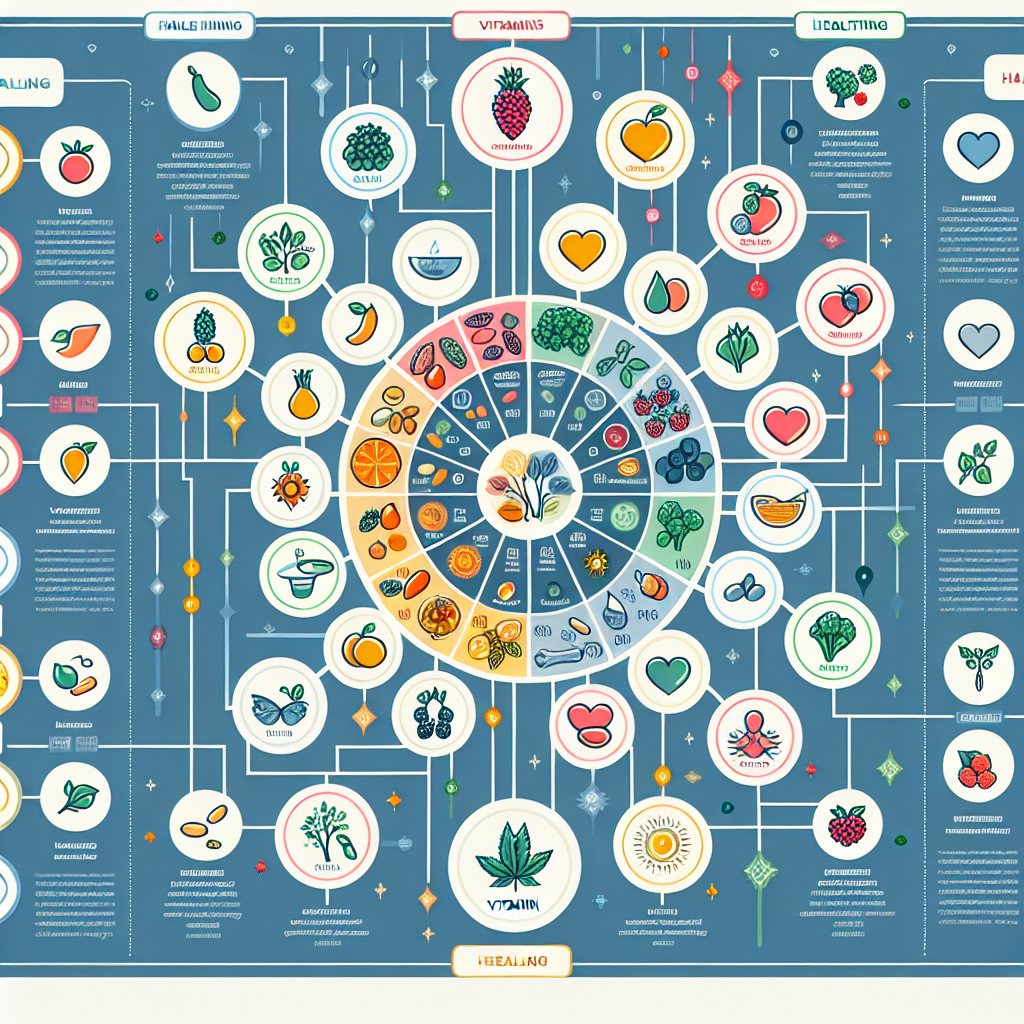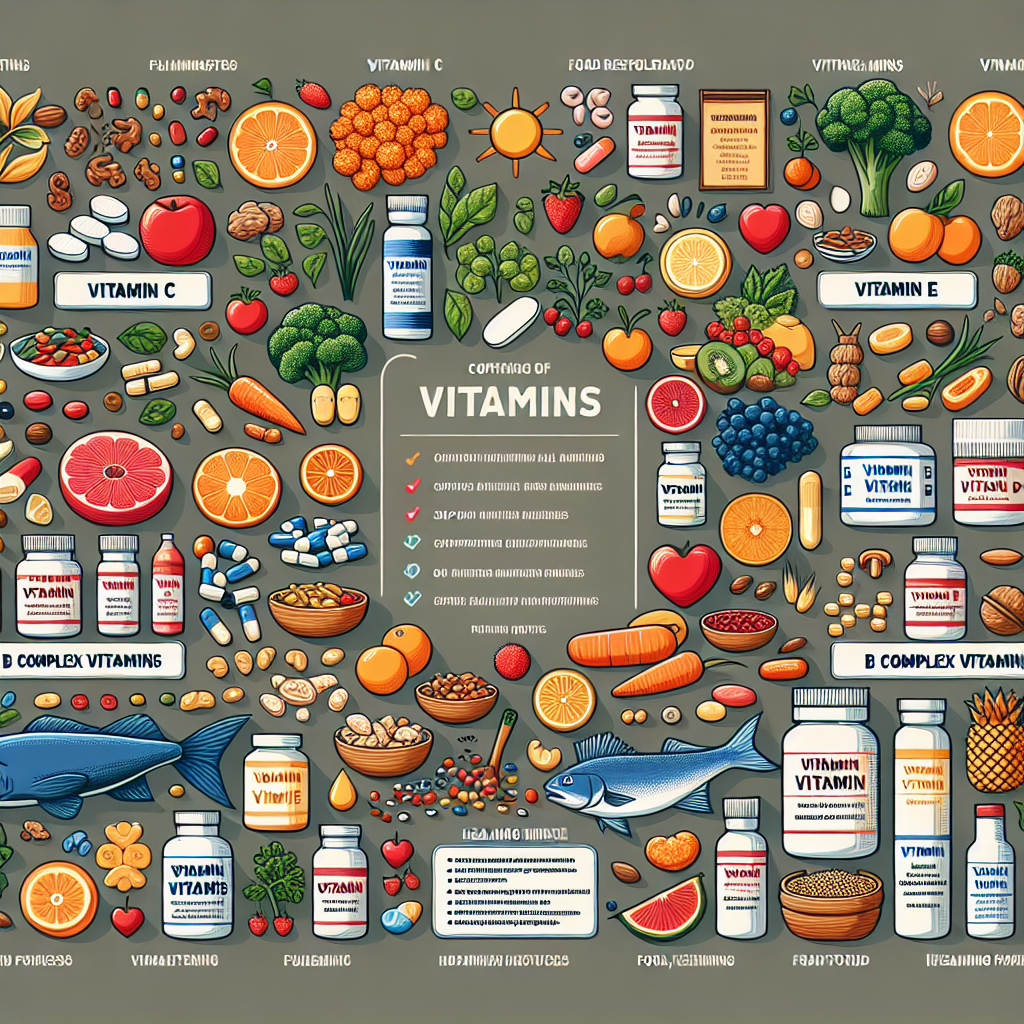Alternative Medicine: Which Vitamins Support Natural Healing?

Discover which vitamins support natural healing in alternative medicine. Learn more and boost your health today. Click here.
Exploring the Role of Vitamins in Natural Healing: A Comprehensive Guide
Alternative medicine has been gaining traction in recent years as more and more people are seeking natural ways to support their health and wellbeing. One of the key components of this holistic approach to health is the use of vitamins to support natural healing. This article aims to provide a comprehensive guide on the role of vitamins in natural healing.
Vitamins are organic compounds that our bodies need in small amounts to function properly. They play a crucial role in various bodily functions, including growth, digestion, and nerve function. Some vitamins also have antioxidant properties, which means they can protect our cells from damage. This is particularly important when it comes to natural healing, as damaged cells can lead to various health problems.
One of the most well-known vitamins in the realm of natural healing is vitamin C. This vitamin is a powerful antioxidant that can protect our cells from damage by harmful molecules called free radicals. It also plays a crucial role in the production of collagen, a protein that helps wounds heal. Moreover, vitamin C can enhance the function of the immune system, which is our body’s natural defense against disease.
Another important vitamin for natural healing is vitamin A. This vitamin is essential for the maintenance of our skin, the first line of defense against bacteria and viruses. It also plays a crucial role in the health of our eyes and the functioning of our immune system. Vitamin A can be found in foods like carrots, sweet potatoes, and spinach.
Vitamin E is another antioxidant that can support natural healing. It protects our cells from damage and helps to maintain healthy skin and eyes. It also plays a role in the functioning of our immune system. Foods rich in vitamin E include nuts, seeds, and green leafy vegetables.
Vitamin D, often referred to as the “sunshine vitamin,” is also crucial for natural healing. It helps our bodies absorb calcium, which is essential for bone health. A deficiency in vitamin D can lead to bone diseases like osteoporosis. Moreover, recent research suggests that vitamin D may also play a role in the functioning of our immune system.
B vitamins, including B6, B12, and folic acid, are also important for natural healing. They help our bodies convert food into energy, create new blood cells, and maintain healthy brain cells. B vitamins can be found in a variety of foods, including whole grains, beans, peas, and lentils, meat, eggs, and dairy products.
While vitamins play a crucial role in natural healing, it’s important to remember that they are just one piece of the puzzle. A balanced diet, regular exercise, adequate sleep, and stress management are also essential for optimal health and wellbeing. Moreover, while vitamins can support natural healing, they are not a substitute for medical treatment. If you have a health condition or are taking medication, it’s important to consult with a healthcare professional before starting any new vitamin regimen.
In conclusion, vitamins are a key component of alternative medicine and can support natural healing in various ways. Whether it’s boosting the immune system, protecting cells from damage, or helping wounds heal, vitamins play a crucial role in our health and wellbeing. By understanding the role of vitamins in natural healing, we can make informed decisions about our health and take steps towards a more holistic approach to wellbeing.
The Power of Vitamins: Unveiling Their Potential in Alternative Medicine

Alternative medicine has been gaining traction in recent years, with more and more people turning to natural remedies to support their health and wellbeing. One area of alternative medicine that has been particularly popular is the use of vitamins to support natural healing. The power of vitamins is undeniable, and their potential in alternative medicine is vast and largely untapped.
Vitamins are organic compounds that our bodies need in small amounts to function properly. They play a crucial role in many bodily functions, including growth, digestion, and nerve function. However, their role in natural healing is perhaps one of the most exciting areas of research in alternative medicine.
Vitamin C, for instance, is well-known for its immune-boosting properties. It helps to stimulate the production of white blood cells, which are essential for fighting off infections. Moreover, it is a powerful antioxidant that can protect our cells from damage by harmful molecules called free radicals. This makes it a valuable ally in the prevention and treatment of various health conditions, from the common cold to cancer.
Similarly, Vitamin D, often referred to as the “sunshine vitamin,” is crucial for bone health. It helps our bodies absorb calcium, which is essential for bone growth and repair. Recent studies have also suggested that Vitamin D may play a role in preventing and treating a number of serious health conditions, including multiple sclerosis and heart disease. Furthermore, it has been found to boost mood and ward off depression, making it a valuable tool in mental health treatment.
Vitamin B12, on the other hand, is essential for nerve function and the production of red blood cells. It also plays a crucial role in DNA synthesis. Deficiency in this vitamin can lead to a host of health problems, including fatigue, weakness, and anemia. Therefore, ensuring adequate intake of this vitamin can support overall health and wellbeing.
Vitamin E is another powerful antioxidant that can protect our cells from damage. It also plays a role in immune function, cell signaling, and other metabolic processes. Its potential in natural healing is vast, with studies suggesting that it may help prevent coronary heart disease, support immune function, prevent inflammation, and even slow down the aging process.
Lastly, Vitamin A is essential for vision, reproduction, and immune function. It also supports the health of our heart, lungs, and kidneys. Like other vitamins, it has antioxidant properties, which can protect our cells from damage. Its role in natural healing is still being explored, but current research suggests that it may help prevent certain types of cancer and support eye health.
In conclusion, the power of vitamins in alternative medicine is undeniable. They play a crucial role in many bodily functions and have the potential to support natural healing in various ways. However, it’s important to remember that while vitamins can support our health, they are not a substitute for a balanced diet and healthy lifestyle. Always consult with a healthcare professional before starting any new supplement regimen. As we continue to explore the potential of vitamins in alternative medicine, it’s exciting to think about the possibilities that lie ahead.
Vitamins and Natural Healing: A Deep Dive into Alternative Medicine
Alternative medicine has been gaining traction in recent years as more and more people seek natural ways to support their health and wellbeing. One of the most popular forms of alternative medicine is the use of vitamins to support natural healing. This approach is based on the belief that the body has an innate ability to heal itself, and that by providing it with the right nutrients, we can enhance this natural process.
Vitamins are organic compounds that our bodies need in small amounts to function properly. They play a crucial role in various bodily functions, including growth, digestion, and nerve function. Some vitamins also have antioxidant properties, meaning they can protect our cells from damage. This is particularly important when it comes to natural healing, as damaged cells can lead to disease and illness.
One of the most well-known vitamins in the realm of natural healing is vitamin C. This vitamin is a powerful antioxidant that can protect our cells from damage caused by free radicals. It also plays a crucial role in the production of collagen, a protein that helps wounds heal. Moreover, vitamin C can enhance the function of the immune system, helping our bodies fight off infections and diseases.
Another vitamin that is often associated with natural healing is vitamin E. Like vitamin C, vitamin E has antioxidant properties that can protect our cells from damage. It also plays a role in the immune function and can help reduce inflammation in the body. This makes it particularly useful for people with chronic inflammatory conditions, such as arthritis.
Vitamin A is another key player in the world of natural healing. It is essential for the health of our skin and mucous membranes, which are our body’s first line of defense against pathogens. Vitamin A also supports the health of our eyes and is involved in the growth and repair of body tissues.
B vitamins, including B6, B9 (folic acid), and B12, are also important for natural healing. They support the health of our nerves and can help reduce inflammation. B vitamins are also involved in the production of red blood cells, which carry oxygen to our tissues and remove waste products.
Finally, vitamin D is crucial for bone health and immune function. It can help reduce inflammation and has been linked to a lower risk of several chronic diseases, including cancer and heart disease. Our bodies can produce vitamin D when our skin is exposed to sunlight, but many people do not get enough of this vitamin, particularly in the winter months.
In conclusion, vitamins play a crucial role in supporting natural healing. They can protect our cells from damage, support the function of our immune system, and help reduce inflammation. However, it’s important to remember that while vitamins can support our health, they are not a substitute for a balanced diet and a healthy lifestyle. Always consult with a healthcare professional before starting any new supplement regimen. Alternative medicine, including the use of vitamins for natural healing, can be a powerful tool in our health arsenal, but it should be used wisely and in conjunction with conventional medicine.